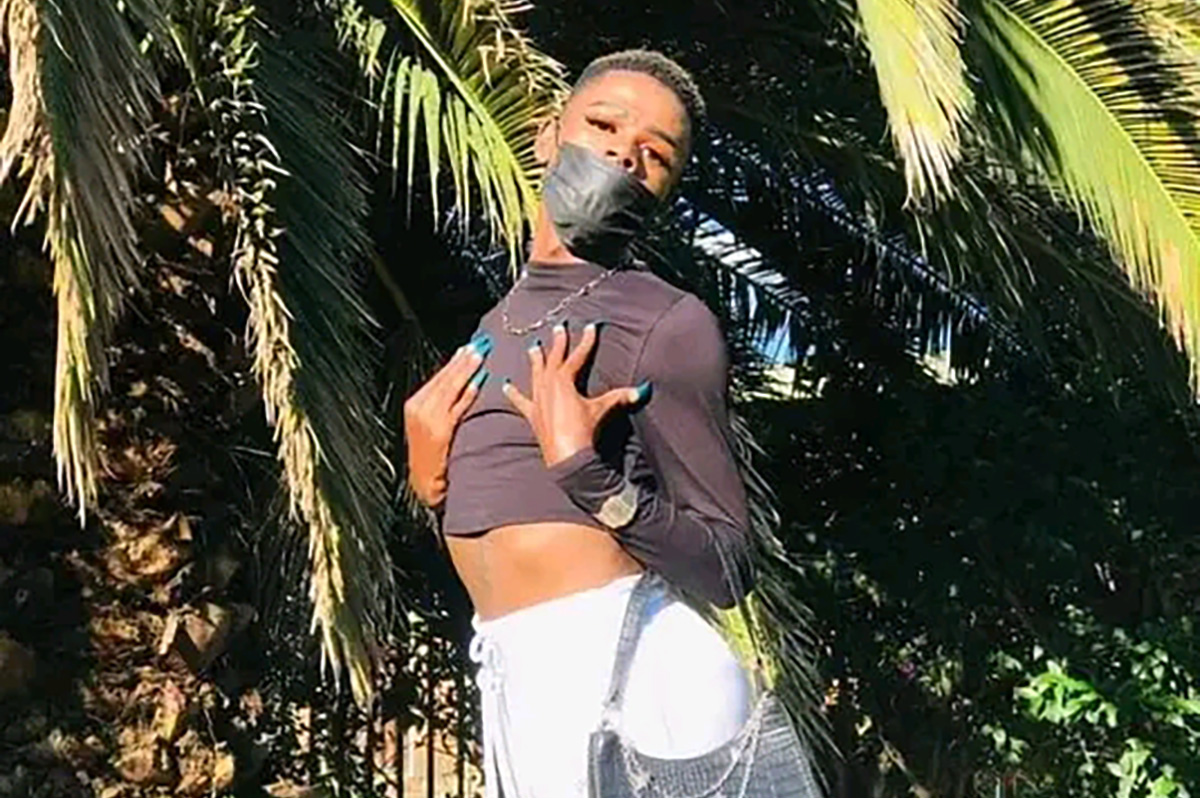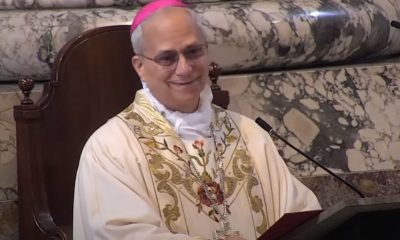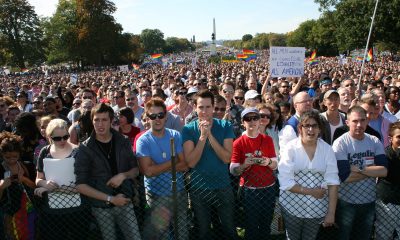Africa
Namibia Supreme Court rules government must recognize same-sex marriages from abroad
Plaintiff couples sought spousal immigration rights

A landmark ruling the Supreme Court of Namibia issued on Tuesday ruled that same-sex marriages conducted outside the southern African country should be recognized by the Namibian government.
Two same-sex couples have emerged victorious in their fight for the recognition of their marriages conducted outside Namibia in a ruling that paves the way for equal rights and spousal immigration benefits for same-sex couples in the country.
The joint cases, initially brought before the court in March, involved South African national Daniel Digashu who is married to Namibian citizen Johann Potgieter, and German national Anita Seiler-Lilles, who is married to Namibian citizen Anette Seiler.
The couples aimed to access essential spousal immigration rights, including permanent residence and employment authorization.
Both couples expressed relief following the ruling.
“I feel like a huge weight has been lifted off of our shoulders. I feel that I can continue with life now, in a sense,” Digashu said. “I cannot explain just how relieved I am that we won’t have to make plans to leave. Now we can stop for a moment and breathe, and take things easy and just know that we are home and there is no potential of being forced to leave.”
For her part, Seiler said after a sleepless night in anticipation of the ruling, she and her wife look forward to celebrating a dream come true.
“We are married and we promised each other that we will stay together no matter what and that promise we’ve upheld through this fight for this recognition of our marriage,” Seiler said. “We would’ve stayed together no matter what but we can stay together here in this beautiful country and we can make it our home country. That was Anita’s biggest wish and that’s my wish as well, and now this wish comes true. It’s so incredible.”
The Supreme Court’s ruling challenged a previous precedent set by the Immigration Selection Board. While acknowledging the binding nature of the precedent, the court asserted that it can depart from its own decisions if they are proven to be clearly wrong.
The court ruled that the Home Affairs and Immigration Ministry’s refusal to recognize same-sex marriages validly concluded outside Namibia violates the constitutional rights of the affected parties.
Furthermore, the court emphasized that the rights to dignity and equality are interconnected, and the denial of recognition for same-sex marriages undermines these fundamental principles. It reaffirmed the principle that if a marriage is lawfully concluded in accordance with the requirements of a foreign jurisdiction, it should be recognized in Namibia.
This ruling represents a significant milestone in the fight for LGBTQ and intersex rights in Namibia. By expanding the interpretation of the term “spouse” in the Immigration Control Act to include same-sex spouses legally married in other countries, the court has taken a crucial step toward achieving equality and inclusivity.
One of the five judges who heard the two appeals dissented from the majority ruling.
He argued that Namibia is under no obligation to recognize marriages that are inconsistent with its policies and laws, emphasizing the traditional understanding of marriage and the protection of heteronormative family life.
The dissenting opinion highlights the ongoing divisions and complexities surrounding the issue of marriage equality in the country. While it underscores the need for continued dialogue and debate, the majority decision in favor of recognizing same-sex marriages highlights the importance of constitutional rights and the principle of equality.
Southern African Litigation Center Executive Director Anneke Meerkotter commended the court’s decision.
“The Namibian Supreme Court has set an important example, interpreting legislation in accordance with the core principles of constitutional interpretation and independent adjudication, thus avoiding irrelevant considerations relating to public opinion and unfounded allegations raised by the government about public policy,” Meerkotter said. “Instead, the court steered the argument back to the history of discrimination in Africa and the necessary constitutional reforms that emphasized transition to dignity and equality without discrimination.”
Speaking on what the ruling means for the LGBTQ and intersex community in Namibia, Seiler said it provides hope and inspiration not only to the couples involved but also to the broader community in Namibia and on the continent.
“We know that we fought this battle not only for us. In the beginning we were fighting it for us, but then we realized it’s not only for us, it’s for other people as well. I’m glad that we did it, that we fought this fight,” she said.
Both Seiler and Digashu said the support of the LGBTQ and intersex community and its allies has been a pillar of strength over the 6-year battle with the courts.
“It has always been about the community because we deserve to have it all without being put down or being told this is not allowed. So, I think this is a big win for the community as a whole. It’s not about us, or just our families. It’s for absolutely everyone!” Digashu said.
Omar van Reenen, co-founder of Equal Namibia, a youth-led social movement for equality, said the ruling has strengthened the promise of equality and freedom from discrimination in the country.
“The Supreme Court really made a resounding decision. It just feels like our existence matters — that we belong and that our human dignity matters,” he said. “The Supreme Court … has upheld the most important thing today and that is the constitution’s promise that everyone is equal before the law and that the rights enshrined in our preamble reign supreme, and equality prevails.”
As the Supreme Court is the highest court in Namibia, decisions made in this court are binding on all other courts in the country unless it is reversed by the Supreme Court itself or is contradicted if Parliament passes a law that is enacted.
Lesotho
LGBTQ activist murdered in Lesotho
Authorities have arrested a suspect in Kabelo Seseli’s death

Kabelo Seseli, a gay crossdresser and LGBTQ activist in Lesotho, was murdered over the weekend in a suspected homophobic attack.
According to the People’s Matrix Association, a LGBTQ rights organization, Seseli’s body was found with stab wounds on their neck and genitals.
“This was not just a murder, it was a hate-driven, dehumanizing act meant to send a message of fear and rejection to our community,” said the People’s Matrix Association in a statement posted to its Facebook page on April 29. “Kabelo deserved to live. Kabelo deserved dignity, safety, and the freedom to exist without fear, just like every Mosotho.”
The LGBTQ rights group also said it is demanding action, justice, and protection from the government, especially given the fact authorities have arrested a suspect.
“We strongly condemn this act of violence and call on the government of Lesotho and law enforcement authorities to conduct a thorough investigation and ensure that those responsible are held fully accountable,” said the People’s Matrix Association. “We also urge leaders and the public to reflect on the role of hate speech and social stigma, which continue to incite violence against LGBTI individuals across our country. We demand action.”
Victor Mukasa of Trans and History Intersex Africa also condemned Seseli’s murder.
“Death is a fact of life, but murder is criminal,” said Mukasa. “Murder of people because they are LGBTIQA+ or for belonging to a particular social group is a hate crime.”
Thato Motsieloa, a gay crossdresser and LGBTQ activist, said he was “deeply distraught to learn about the brutal murder of Kabelo Seseli.” Motsieloa said he and Seseli met on Facebook.
“Although we never met in person, we had plans to do so,” said Motsieloa. “The manner of his death is particularly heartbreaking, and the fact that his killers desecrated his body by removing his private parts is utterly heinous. I hope justice is served, and those responsible face the consequences of their horrific actions. My sincerest condolences go out to Kabelo’s family, may his soul rest in eternal peace.”
Lesotho in 2012 decriminalized consensual same-sex sexual relations. Marriage, however, remains limited to heterosexual couples. There have also been sporadic reports of anti-LGBTQ hate crimes since 2012.
The International Commission of Jurists, in partnership with Outright International, a New York-based LGBTQ advocacy group, in 2022 held a workshop with the Lesotho judiciary that focused on human rights for the LGBTQ community.
The judiciary noted LGBTQ people exist, but acknowledged there is no local jurisprudence on their rights, even though the country’s constitution guarantees the right to respect private and family life and freedom from discrimination.
Religious and cultural norms, like in many African countries, play a pivotal role in how society perceives the LGBTQ community. Many people in Lesotho disregard the existence of LGBTQ people, even though the government is trying to make room for the acknowledgment of LGBTQ rights.
Outright International Africa Advocacy Officer Khanyo Farise says the judiciary’s active engagement with the LGBTQ community is an important step towards ensuring LGBTQ rights are upheld.
“Judges and judicial officers play an important part in ensuring access to justice for LGBTIQ+ people, but also have an important role in producing judgments which can advance their human rights,” said Farise.
ICJ Africa Communications and Legal Officer Mulesa Lumina said though the ICJ is encouraged by these developments, particularly the willingness of judiciary members to understand the plight of the community, LGBTQ people continue to face harassment, discrimination, abuse and violence because of their actual or perceived sexual orientation and gender identity.
“We will continue working with partners, such as the People’s Matrix and Outright International, to ensure the enforcement of the country’s obligations under international human rights law, which entitle LGBTIQ persons to the full range of human rights without discrimination,” said Lumina.
Kenya
Kenya Red Cross-owned hotel to host anti-LGBTQ conference
Speakers from US, European countries to participate in May 12-17 gathering

Plans to host a family values meeting next month in a 5-star hotel in Nairobi that the Kenya Red Cross Society co-owns have sparked an uproar among local queer rights groups.
The groups accuse the Kenya Red Cross of violating its Global Fund commitment of protecting key populations by allowing its Boma Hotel to host an “anti-gender and anti-LGBTQ” conference.
Influential guest speakers from the U.S., the Netherlands, Spain, and Poland will preside over the Pan-African Conference on Family Values that will take place from May 12-17. The Kenyan advocacy groups say these speakers’ organizations are globally recognized for undermining LGBTQ rights.
“As the principal recipient of Global Fund in Kenya, hosting this event contradicts (the) Red Cross’s humanitarian mission and threatens the safety and dignity of people living with HIV, women and LGBTQ+ individuals, the communities that Kenya Red Cross Society has long committed to supporting,” the queer rights groups state.
The LGBTQ groups that have criticized the Kenya Red Cross include Upinde Advocates for Inclusion, the Initiative for Equality and Non-Discrimination, and Gay and Lesbian Coalition of Kenya. They have also launched an online signature collection drive to compel the Kenya Red Cross to withdraw the hotel from hosting the “Promoting and Protecting Family Values in Challenging Times”-themed conference.
“The event’s so-called ‘family values’ narrative is a smokescreen for policies that push hateful legislation and promote death, discrimination, femicide, gender-based violence, and restrict fundamental freedoms across Africa,” the groups said.
The pro-life Western organizations that are scheduled to participate in the conference include Family Watch International from the U.S., CitizenGo from Spain, the Ordo Luris Institute from Poland, Christian Council International from the Netherlands, the New York-based Center for Family and Human Rights (C-FAM), and the Foundation for American Cultural Heritage. Their local counterparts include the National Council of Churches of Kenya, the Kenya Christian Professionals Forum, the Africa Christian Professionals Forum, and the Evangelical Alliance of Kenya.
C-FAM President Austin Ruse; Family Research Council Vice President for Policy and Government Affairs Travis Wever; Global Life Campaign Executive Director Thomas W. Jacobson; and the Rev. Ricky Chelette, executive director of Living Hope Ministries, Inc., and president of the Institute of Biblical Sexuality are among the U.S. guest speakers. Other participants include Henk Jan van Schthorst, president of Christian Council International’s board of directors, Ordo Luris Institute President Jerzy Kwasniewskie and his colleague, Rafal Dorosinski, director of the group’s Legal Analysis Center.
The Kenyan groups through their online petition — “Tell Red Cross Kenya Not to Give Hate a Platform” — has so far raised more than 1,000 of the 10,000 signatures they hope to collect. The petition is addressed to Red Cross Kenya Secretary-General Ahmed Idris and his predecessor, Abbas Gullet, who is the hotel’s director.
“We call on you to immediately cancel this booking and publicly reaffirm Red Cross’ commitment to human rights, health and inclusivity,” the petition reads. “Failure to act will raise concerns about whether (the) Red Cross can still be trusted by the community to lead with empathy and fight for their rights.”
The Kenya Red Cross, however, maintains the Boma Hotel is a separate entity, even though public records indicate it is one of the facility’s shareholders.
The LGBTQ groups note the hotel should be a safe space that promotes inclusion, not platforms that enable “harmful gathering” for hate and exclusion by “dangerous groups.”
“By providing a venue for this event, Red Cross directly enables a platform for hate and discrimination — a stark contradiction to the values of inclusivity, humanity, and nondiscrimination that the organization claims to uphold,” they said.
The organizations further warn that proceeding to host the conference threatens the relationship between the Red Cross and the marginalized communities who have long depended on the humanitarian organization for support and protection. CitizenGo has nonetheless criticized the LGBTQ groups, which it describes as “radical activist groups” for “trying to silence a pro-family event” and asked the Kenya Red Cross and the Boma Hotel not to back down.
“These groups are calling the event ‘hateful’ because it affirms the natural family — marriage between a man and a woman — and the dignity of every human life, including the unborn,” Ann Kioko, the group’s campaign director for Africa and the U.N., said.
Through an online counter signature collection drive, Kioko holds CitizenGo and other groups won’t be intimidated, silenced or apologize to the queer rights groups for defending “our families, our faith and our future”.
“The real goal of these foreign-funded activist groups is to impose LGBTQ and gender ideologies on Africa — ideologies that have led elsewhere to the confusion of children, the breakdown of family structures and the rise of sexual libertinism that results in abortion, STIs and lifelong emotional and psychological trauma,” Kioko stated.
Africa
LGBTQ activists in Africa work to counter influence of American evangelicals
Lawmakers continue their crackdown on queer rights

American far-right evangelical organizations fund African MPs and religious groups and support their advocacy efforts against homosexuality.
The support for the two influential groups on the continent has contributed to increased homophobic rhetoric for conservative family values through religious teachings and public policy. Open for Business, a coalition of leading global organizations that champion LGBTQ inclusion, revealed this trend in its latest report that surveyed the East African countries of Kenya, Uganda, Tanzania, and Rwanda.
“The anti-LGBTQ+ agenda driven by Christian groups in Kenya and Uganda has received significant funding and support from foreign anti-rights groups, particularly from U.S. far-right evangelical organizations,” the report states.
The two nations, along with Tanzania, have had heightened curtailing of queer rights in recent years through legislation and religious protests. Homosexuality remains criminalized in the three countries, with varied jail terms of not less than 10 years.
“There is much misinformation and disinformation being circulated in Kenya about LGBTQ+ issues — churches are behind much of this, and they leverage selective interpretations of religious teachings to stir up anti-rights sentiments,” the report reads.
It adds religious groups have attained greater influence with their homophobic campaigns under President William Ruto, who is Kenya’s first evangelical Christian head of state.
The American far-right evangelical churches are part of the New York-based World Evangelical Alliance, whose global believers are considered “incredibly diverse and vibrant people of faith.”
“They are bound together by spiritual convictions that they consider ‘non-negotiable’ while acknowledging a wide variety of expressions in non-essential matters such as their style of worship,” the Rev. Leon Morris, the founder member and former chairman of Evangelical Alliance of Victoria, states on WEA’s website.
The religious groups under the Kenya Christian Forum, in partnership with Linda Uhai Consortium (or Protect Life in Swahili) composed of pro-life organizations, late last month held their annual march in Nairobi, the country’s capital. Opposition to LGBTQ rights was among the agenda items.
Some anti-homosexuality placards that march participants held read, “Homosexuality is abnormal,” “Rainbow belongs to God,” “No to Western cultural imperialism, yes to family values,” and “In the beginning God made them; male and female.” The organizers also criticized the Kenyan courts over their recent rulings in favor of the queer community, such as allowing the National Gay and Lesbian Human Rights Commission to register as a non-governmental organization.
The African Inter-Parliamentary Conference on Family Values and Sovereignty is a caucus of African MPs that American far-right evangelical organizations support to drive anti-LGBTQ policies in their countries.
The group held its second conference in Entebbe, Uganda, last May. The definition of sex and sexuality and their impact on LGBTQ issues were among the topics that delegates from more than 20 countries discussed.
The three-day conference that Ugandan Parliament Speaker Anitah Among and Henk Jan Van Scothorst, director of the Christian Council International, sought to curb homosexuality. The delegates also resolved to have the African Caribbean Pacific and European Union Economic Partnership, also known as the Samoa agreement, reviewed for undermining the sovereignty of African governments over LGBTQ rights and related “human rights” issues.
The far-left government officials and queer lobby groups from the U.K. and other Western countries, meanwhile, are engaging with LGBTQ activists in Africa to counter American evangelical organizations’ anti-homosexuality campaigns.
British officials, led by Equalities Minister Nia Griffith, in February met with Sexual Minorities Uganda Executive Director Frank Mugisha and Erick Mundia, a senior policy advisor for Ipas Africa Alliance, a Kenya-based abortion rights advocacy group.
“As part of our Queering Atrocity Prevention program, which seeks to center LGBTQI+ rights and risks as part of atrocity prevention and wider peace and security, our team held a parliamentary roundtable exploring the implications of transnational far-right organizing for global LGBTQI+ rights and how the UK parliament can respond,” the statement reads.
Klara Wertheim, head of global programs at Stonewall, and Farida Mostafa, queering atrocity prevention manager of Protection Approaches, were among the other representatives of queer rights organizations who participated in the roundtable with highlighted “the implications of transitional far-right activity for global LGBTQI+ rights.”
“Discussions with MPs, Lords, parliamentary staff and civil society representatives centered on tactics used by far-right actors to disrupt democratic rights-based systems,” reads the statement. “The impacts of these malign efforts on sexual and gender-based rights in the UK and abroad, and how parliamentary actors can contribute to stemming these trends in their parliamentary work.”
-

 The Vatican16 hours ago
The Vatican16 hours agoAmerican cardinal chosen as next pope
-

 a&e features22 hours ago
a&e features22 hours agoYour guide to the many Pride celebrations in D.C. region
-

 U.S. Supreme Court3 days ago
U.S. Supreme Court3 days agoSupreme Court allows Trump admin to enforce trans military ban
-

 District of Columbia2 days ago
District of Columbia2 days agoWorldPride permits for National Mall have yet to be approved











